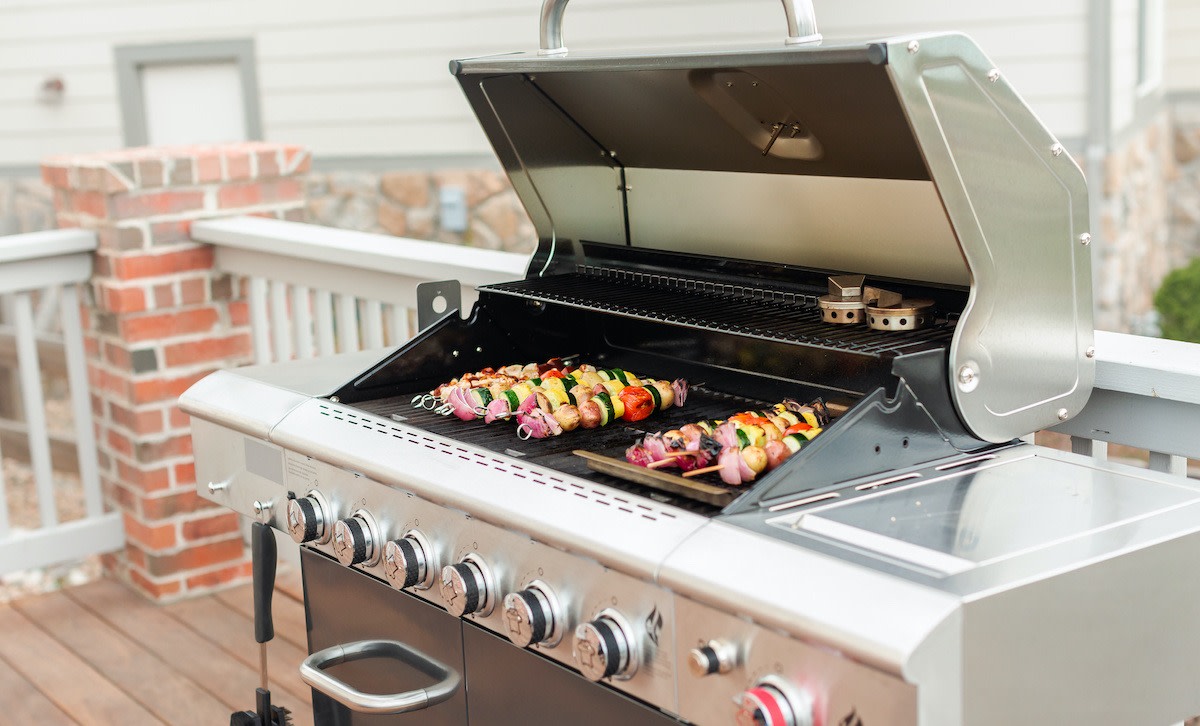Natural Gas vs. Propane Grills: What Are the Differences?
Written by MasterClass
Last updated: Dec 7, 2021 • 3 min read
Natural gas grills and propane gas grills offer similar barbecue grilling results with differences in the cost and convenience based on the type of gas used.
Learn From the Best
Choosing Propane vs. Natural Gas Grills
When it comes time to select a fuel source for your outdoor grill, the choice often depends on whether you have a natural gas hookup available in your outdoor kitchen. If you don’t, your only option is a propane grill. If you have a natural gas hookup, you can compare the two types of fuels’ affordability, convenience, and efficiency.
Although propane technically burns three times hotter than natural gas, they generally produce the same amount of heat, and your choice won’t affect the flavor of your food.
What Are Natural Gas Grills?
Natural gas (NG) grills are outdoor cooking appliances that use natural gas as a fuel source to provide heat for grilling. Natural gas is methane pressurized into a liquid form from fossil fuels, hence the name “natural.” Natural gas is difficult to store and transport, so homes powered by natural gas receive it through underground pipelines.
You won’t have to buy the natural gas separately, but you may see an increase in your utility bill. If your home is electricity-powered, you may not have access to a natural gas pipeline.
What Are Propane Grills?
Propane grills, also called liquid propane (LP) grills, are outdoor cooking appliances that use liquid propane as a heat source for grilling. Liquid propane is a type of hydrocarbon gas in the same category as butane or ethane. You can buy liquid propane in tanks from hardware stores and some gas stations and supermarkets.
Propane grills are portable and don’t require a natural gas hookup, but purchasing and moving the tanks can be cumbersome.
Natural Gas vs. Propane Grills: What Are the Differences?
There are some key differences to consider when choosing between natural gas and propane, especially the cost, setup, and availability.
- Availability: If you have a natural gas hookup in your backyard or patio, a natural gas grill may be more convenient, avoiding the need to purchase and transport tanks of propane. By using your home’s gas line, you won’t have to worry about running out of propane or arriving at the store only to find they’re sold out of tanks. That said, if there’s a problem with your home’s gas hookup, your propane grill will come in handy.
- Cost of gas: Natural gas is generally much cheaper to purchase than propane, especially when you consider the cost of propane tanks and the cost of transportation to and from the place where you buy your tanks.
- Energy efficiency: In the United States, the measurement for the energy efficiency of gases is Btu (British thermal units). These units measure the total amount of energy needed to increase the temperature of one pound of water by one degree Fahrenheit. Propane is generally more energy-efficient, measuring at 2,516 Btu per cubic feet compared to natural gas at 1,030 Btu per cubic feet.
- Environmental impact: All types of grilling have an environmental impact. Some people consider propane more eco-friendly than natural gas since it’s more energy-efficient and may release fewer emissions. Since propane is a byproduct of natural gas production, it is also a nonrenewable, fossil-fuel resource, making neither option especially environmentally friendly. Learn more ways to reduce your carbon footprint.
- Portability: Propane gas grills are more portable than natural gas grills since you can move the grill and the fuel tank together. Conversely, you will need to connect a natural gas grill to a natural gas outlet and move it near the gas main or gas pipe. Their portability makes propane grills an excellent option for renters or anyone who doesn’t want to feel tied to a natural gas hookup.
- Safety: Natural gas is a very light gas that will dissipate if there is a leak, reducing fire risk. Propane gas is heavier and will linger in the leak area, potentially causing a fire hazard. It’s essential to use and store both types of gas grills in well-ventilated areas.
- Setup costs: A natural gas barbecue grill can often be more expensive overall than a propane grill due to the upfront costs of the components needed to route an existing natural gas line from your home. With a propane grill, you won’t need a special setup.
Want to Learn More About Cooking?
Become a better chef with the MasterClass Annual Membership. Gain access to exclusive video lessons taught by the world’s best, including Aaron Franklin, Yotam Ottolenghi, Gabriela Cámara, Niki Nakayama, Chef Thomas Keller, Dominique Ansel, Gordon Ramsay, Alice Waters, and more.
